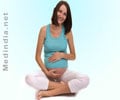The rate of pregnancy-associated cancer is rising steadily and it is not fully explained by the rise in older mothers says new research published today.

A total of 1,798 pregnancy-associated cancers were identified from the total number of maternities corresponding to an overall incidence rate of 137.3 per 100,000 maternities. The research found that between 1994 and 2008 the incidence rate of pregnancy-associated cancer increased from 112.3 to 191.5 per 100,000 maternities.
During this period maternal age also increased. The percentage of women aged 35 years and over increased from 13.2% to 23.6% in New South Wales.
Despite this the research found that only 14% of the increase was explained by increasing maternal age. The research looked at independent risk factors for pregnancy-associated cancer including older maternal age, Australian-born, socio-economic status, multiparity, multiple pregnancy and prior diagnosis of cancer.
The authors state that improved diagnostic techniques, detection and increased interaction with health services during pregnancy may contribute to higher incidence rates of pregnancy-associated cancer. They also say that the genetic and environmental origins of pregnancy-associated cancers are likely to pre-date the pregnancy, however the hormones and growth factors necessary for fetal growth may accelerate tumour growth.
The most common cancers were melanoma of skin, breast cancer, thyroid and other endocrine cancers, gynaecological and lymphohaematopoeitic cancers. However it must be noted that Australia has the highest incidence of melanoma in the world.
Advertisement
Professor Christine Roberts, Clinical and Population Perinatal Health Research, Kolling Institute of Medical Research, University of Sydney, New South Wales and co-author of the paper said:
Advertisement
"Although maternal age was a strong risk factor for cancer, increasing maternal age explained only some of the increase in cancer incidence. Pregnancy increases women's interaction with health services and the possibility for diagnosis is therefore increased. Furthermore, pregnancy may actually influence tumour growth."
John Thorp, BJOG Deputy-Editor-in-Chief added:
"Pregnancy is a time when a woman comes into contact with healthcare workers more frequently than normal and this may play a part in certain cancers being picked up more. The most common cancer was melanoma of the skin which it must be noted is more common in Australia than other countries."
Source-Eurekalert














